How Fast to Qualify For United States Swimming Relays in Paris?
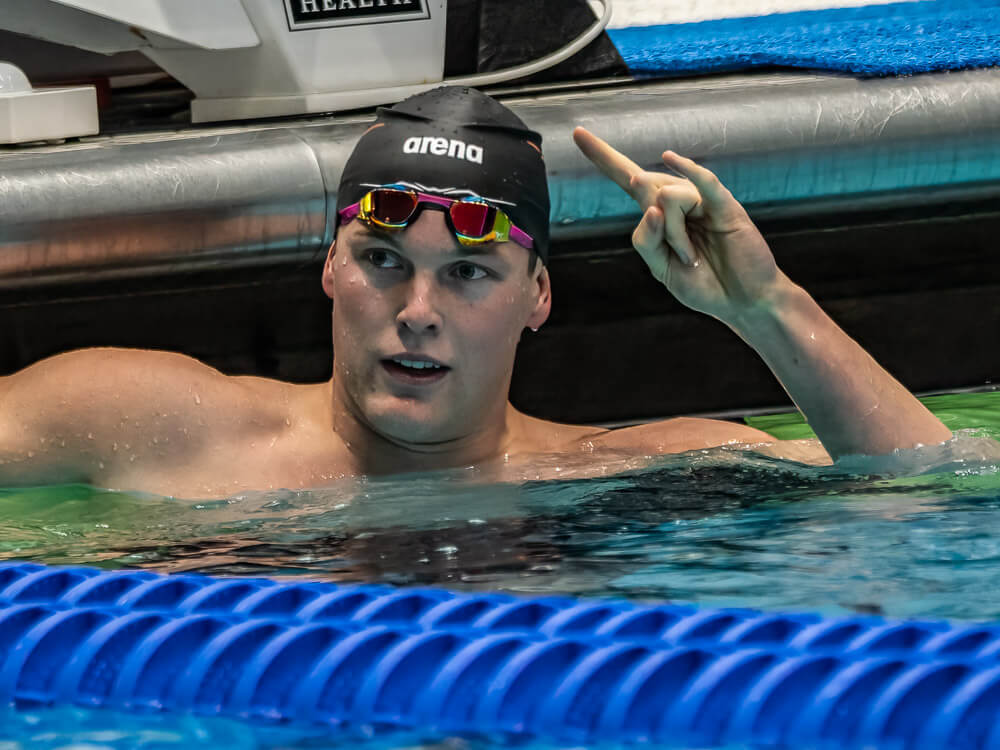
How Fast to Qualify For United States Swimming Relays in Paris?
In the final leadup to next month’s Olympic Trials, plenty of top contenders are putting an inordinate focus on the 100 and 200 freestyle. Rightfully so, with the top-six male and female swimmers in each race likely to earn relay bids on the Olympic team bound for Paris, barring an unlikely roster crunch (which did happen in 2021; more on that below). Any swimmers who races in relay prelims earn whatever medal the finals team clinches.
Relay events at the Olympic Trials bring out a bevy of contenders, with some switching their focus onto the freestyle races to maximize their chances of reaching the Games. In nearly every instance, at least one swimmer comes from totally off the radar to jump into the mix. Perhaps that’s a college swimming standout without much previous long course success or a swimmer best known for their abilities in another stroke.
All this is to say that we will have surprises in these events in Indianapolis. Most likely, we will see extremely competitive semifinal matchups with high-profile names getting locked out but then a handful of slower times in the final as swimmers end up racing each other more than the clock.
How fast must the swimmers go to earn their spots on the team? Let’s take a look at each event. We will also note the cutoff times for qualification onto the Tokyo Olympic team in 2021 as well as Worlds in 2022 and 2023.
Men’s 200 Freestyle
2021: 1:46.49 (Patrick Callan)
2022: 1:46.93 (Trey Freeman)
2023: 1:47.02 (Henry McFadden)
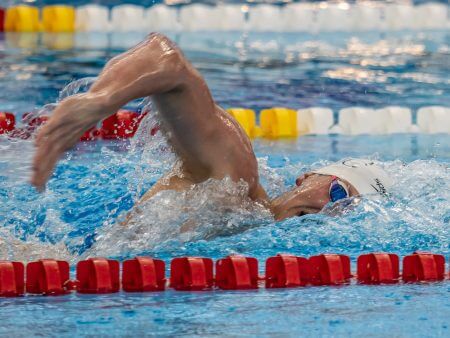
Kieran Smith has been a consistent member of the U.S. men’s 800 free relay for several years — Photo Courtesy: Peter H. Bick
This year’s U.S. men’s 800 freestyle relay will face a huge challenge from Great Britain, the reigning Olympic champions and last year’s world champions, but there will be some fast swimming on offer here as the team is assembled. Luke Hobson is the favorite after finishing fifth in the 200 free at last year’s Worlds and then in bronze-medal position at this year’s watered-down global meet. He also swam the fastest time ever in the 200-yard free at the NCAA Championships.
Drew Kibler and Kieran Smith are both capable of 1:45-low performances in this event, with the two men finishing fourth and fifth, respectively at last year’s Worlds, while Carson Foster split an incredible 1:43.94 at this year’s global meet. Jake Mitchell was 1:46-low flat-start and 1:45-low on a relay in 2023. And those are just the favorites. Swimmers like Baylor Nelson, Aaron Shackell, Henry McFadden, Brooks Curry, Patrick Sammon and more have 1:46-low (or better) potential.
We’ll guess that five or six swimmers are sub-1:46 in the Trials semifinals, with some going 1:46.2 or 1:46.3 and getting left out. In the final, maybe one swimmer goes 1:46 and makes the team but no more.
Women’s 200 Freestyle
2021: 1:57.61 (Brooke Forde)
2022: 1:57.82 (Alex Walsh)
2023: 1:56.91* (Leah Smith)
*In 2023, with Katie Ledecky withdrawing from the individual 200 freestyle, Anna Peplowski was added to the Worlds team after placing seventh in the 200 free at 1:57.59. USA Swimming has stated that in the future, no new relay swimmers will be added to the team if a swimmer withdraws from an individual event.
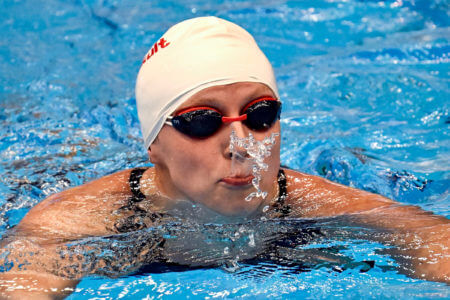
Katie Ledecky remains a stalwart on the U.S. women’s 800 free relay — Photo Courtesy: Andrea Staccioli / Deepbluemedia / Insidefoto
Last year, a clear top-four emerged for the U.S. as Claire Weinstein touched out Ledecky for the 200 free national title while Bella Sims and Erin Gemmell were both 1:56-lows. Teenager Alex Shackell dropped a whopping five seconds from her best time to finish fifth, and she ended up on the World Championships relay in Fukuoka with Weinstein struggling.
For the purposes of relay qualification, much depends on if Ledecky swims the individual 200 free all the way through to the final. If she is already qualified for Paris (likely), she might only swim through prelims or semifinals to allow another swimmer to race for a top-six spot in the final.
Regardless of Ledecky’s participation, a 1:56-mid swim looks to be the cutoff this time. All of last year’s primary contenders are returning while veterans like Paige Madden are swimming well, and swimmers like Katie Grimes, Camille Spink and Cavan Gormsen could all put themselves into the mix.
Women’s 100 Freestyle
2021: 54.12 (Allison Schmitt)
2022: 54.09 (Mallory Comerford)
2023: 53.51 (Maxine Parker)
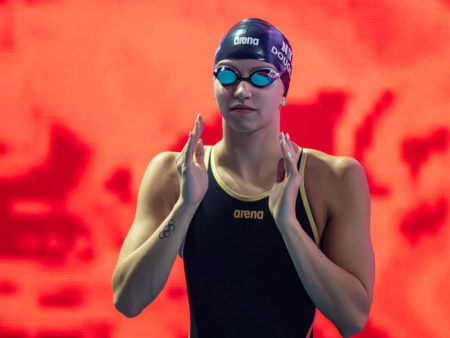
Kate Douglass is currently the fastest 100 freestyler in the United States — Photo Courtesy: Peter H. Bick
Last year’s U.S. Nationals final was the quickest ever, with Sims and Catie DeLoof both finishing outside of the top-six with 53.7s. We have seen more of the same this year, with four Americans going 53.25 or better at last month’s TYR Pro Swim Series in San Antonio: Kate Douglass, Torri Huske, Gretchen Walsh and back-to-form veteran Simone Manuel. Meanwhile, Abbey Weitzeil has been sub-53 on numerous occasions in the past, including last year.
Will it take sub-53 to qualify for the top-six at Trials? No, probably not, but with the American women showing better sprint depth than ever before, we might not be far off. The 53.51 that Maxine Parker swam to finish sixth last year is probably close to what it will take to qualify for the final at Olympic Trials, and maybe a tick or two faster will get onto the team.
We cannot forget about veterans Olivia Smoliga, Natalie Hinds and Claire Curzan in all this, and the 100 free could also be an opportunity for swimmers like Gemmell, Shackell, Spink, Katharine Berkoff, Gabi Albiero or even Beata Nelson. Anna Moesch is a teenager who cannot be discounted. With six spots and several likely openings, this is an event that makes sense for women to target, hence the recent improvement across the board.
Men’s 100 Freestyle
2021: 48.22** (Bowe Becker)
2022: 48.38 (Justin Ress)
2023: 48.18 (Justin Ress)
**In 2021, Ryan Held finished sixth in the 100 freestyle in 48.46, but he did not qualify for the Olympic Team because of a cap of 12 relay-only swimmers that could be taken to the Games.
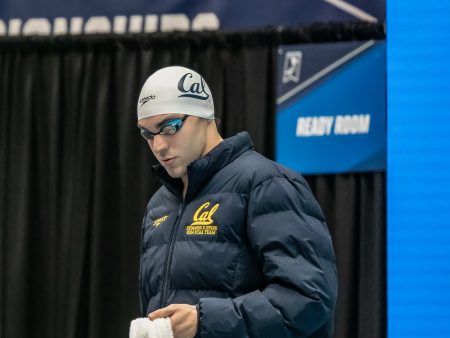
Jack Alexy broke out last year with individual silver medals in the sprint freestyle events at the World Championships — Photo Courtesy: Peter H. Bick
The field in the men’s 100 free at last year’s U.S. Nationals was the deepest ever assembled on U.S. soil, with four men going sub-48 in prelims and a time of 48.37 required to qualify for the final. It should be even tougher this time around with the prospects of Olympic qualification plus the three-round format of the Olympic selection meet, plus the fact that the young American men who headlined last year’s final have received a key year of reasoning, plus the return of Caeleb Dressel.
Jack Alexy won silver in the 100 free at last year’s Worlds, becoming the second-fastest American ever. Chris Guiliano posted a 47.49 time trial earlier this year. Those two are favored to go 1-2 at Trials, but Dressel is looming, having clocked 48.40 at the recent San Antonio Pro Series.
Meanwhile, Matt King has built a solid relay reputation over the last 12 months, and Held is looking to get back on the Olympic team following his 2021 heartbreak. This year’s stacked roster of swimmers will include more than a dozen men who have been 48-mid or better in their careers, with Destin Lasco, Macguire McDuff, Justin Ress, Kibler, Smith, Curry, Hobson, Hunter Armstrong, Jonny Kulow and many more among potential threats.
The 100 free semifinals in Indianapolis will be electric. Book it. Swim 48.2, maybe even 48.1, and you can watch the final from the seats. At some point at Trials, at least six men will go under 48 — and at least one gets left behind when he does not match that time in the championship heat. Expect a slightly slower race from places four or five through eight in the final, and we’ll see who can come through when it matters most.
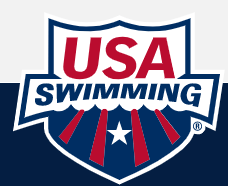
- PSYCH SHEET
- HOTEL INFORMATION
- LIVE RESULTS
- MEET INFO
- TV SCHEDULE
- DAY 1 PRELIMS RESULTS
- DAY 1 FINALS RESULTS
- DAY 2 PRELIMS RESULTS
- DAY 2 FINALS RESULTS
- DAY 3 PRELIMS RESULTS
- DAY 3 FINALS RESULTS
- DAY 4 PRELIMS RESULTS
- DAY 4 FINALS RESULTS
- DAY 5 PRELIMS RESULTS
- DAY 5 FINALS RESULTS
- DAY 6 PRELIMS RESULTS
- DAY 6 FINALS RESULTS
- DAY 7 PRELIMS RESULTS
- DAY 7 FINALS RESULTS
- DAY 8 PRELIMS RESULTS
- DAY 8 FINALS RESULTS
- DAY 9 FINALS RESULTS
- FULL RESULTS BOOK



